Final report for SKY18-001
Project Information
Advisors
- (Educator and Researcher)
- (Educator)
- (Educator)
- (Educator)
- (Educator)
- (Educator and Researcher)
- (Educator and Researcher)
- (Educator)
- (Educator)
- (Educator)
- (Educator and Researcher)
- (Educator)
- (Educator)
Education
Education & Outreach Initiatives
To train additional Organic Transition Trainers to provide technical assistance to growers looking to transition to Certified Organic production.
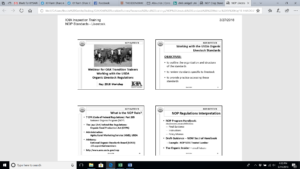
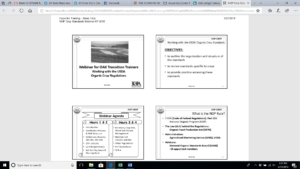
The Organic Association of Kentucky currently has four part-time Transition Trainers available to assist producers who are interested in transitioning to USDA-certified organic production. Transition Trainers are available for one-on-one consultations, providing a personal level of service and technical assistance on-site, at the farmer's convenience. Transition Trainers help growers develop farm transition plans, navigating regulations according to organic certification, share fundamental principles of organic agriculture, offer practical details about organic crop, livestock, grain, and dairy production, make connections with marketing opportunities, provide templates for recordkeeping, and share valuable information on grant resources and local farming inputs appropriate for their systems. We worked closely with staff from NRCS, Extension and KDA for this initial project implementation and our partners have continued to see this program as a valuable resource for growers ready to go organic.
Based on positive feedback and clear grower demand, OAK will continue to offer this unique one-on-one transition support to growers providing information about production practices, recordkeeping, grants, transition plans and more. We anticipate working with an additional 30 farmers in 2018. And we are expanding outreach about the program through presentations, mailings and strategic networking. With increased outreach, we anticipate hearing from more growers who are interested in working with the program so we MUST prepare to hire additional transition trainers in the geographic areas with high demand. To do this we hosted Garry Lean, a trainer from the International Organic Inspectors Association (IOIA), to lead a multi-day “training of the trainers” workshop so that our new Transition Trainers are certified and proficient in interpreting the National Organic Program regulations for our Kentucky farmers. We also used this as an opportunity to invite interested stakeholders from partner agencies such as UK Extension, KSU Extension, NRCS, KDA, Grow Appalachia and AgrAbility to participate in the training.
Training Schedule:
National Organic Program Crop Standards Webinar: Wednesday, April 4th 10am-2pm
- Screenshot of webinar slides attached
National Organic Program Livestock Standards Webinar: Thursday, April 26th 10am-2pm
- Screenshot of webinar slides attached
3 day in-person training in Lexington, KY: May 1-3 8am-5pm
- Detailed agenda attached
2018 OAK Transition Trainer Training Participants:
Mark Walden
Production Efficiency Advisor
Grow Appalachia
Joshua Knight
Senior Extension Associate, Horticulture
Center for Crop Diversification
University of Kentucky
Alexis Sheffield
Horticulture Agent
Boyle County Cooperative Extension Service
University of Kentucky
Chris Smigell
Extension Associate, Small Fruits
University of Kentucky
Kevin Gurtowski
Extension Associate
Kentucky State University
Jann Knappage
Food System Specialist
Nutrition Education Program
University of Kentucky Cooperative Extension
Wes Krug
Soil Conservationist
NRCS – Lebanon Office
Mike Lewis
Project Manager
Kentucky AgrAbility
University of Kentucky
Leigh Whittinghill
Assistant Professor of Urban Agriculture
College of Agriculture, Food Science and Sustainable Systems
Kentucky State University
Brooke Gentile
Executive Director
Organic Association of Kentucky
UK SSARE MSP funds provided partial funding for this work led by the Organic Association of Kentucky.
The Transition Trainer Training consisted of two 4 hour webinars and three full days of in-person trainings. One of the webinars focused on the National Organic Program Crop Standards and the other covered Livestock Standards. The three days on-site at the University of Kentucky Horticulture Research Farm provided a rich group learning environment for an intensive on the NOP regulations as well as the valuable experience of walking through a mock-inspection for both crop (at the UK farm) and livestock (at Elmwood Stock Farm) organic certification. These opportunities allowed participants to become proficient in the standards, understand how to interpret them and apply that knowledge to helping farmers, and taught participants what to expect during an inspection. This was also an important learning experience for OAK’s Executive Director and we are developing new tools for the Transition Trainer Program as a result.
10 participants completed the training and OAK received word this week (5/19/18) that 9 of the 10 passed the final exam. OAK will now reach out to all the participants to ask for feedback about their experience in the training, how they envision using this new information to help farmers in their network transition, and if they are interested to do this work through their current position or as an independent contractor with OAK. Participant evaluations are forthcoming.
Transition Trainers provided this support to 51 Kentucky farmers. 27 of the 51 farmers we worked with now have certified organic operations or are in active transition, and 20 more are scheduled to apply this year. Growers report experiencing expanded market opportunities, appreciate the network and resources OAK trainers share with them, and are grateful for the support when navigating an unfamiliar and sometimes challenging regulatory system.
The goal of the conference is to bring together a national and international audience of academic and research-oriented professionals to share and gain knowledge on urban food systems and the role they play in global food security. This symposium includes knowledge on: urban agricultural production, local food systems distribution, urban farmer education, urban ag policy, planning and development, food access and justice, and food sovereignty. Lilias Petitt-Scott of the Louisville Conservation District attended the conference on a travel scholarship from UK SSARE MSP.
From Lilias:
"In my work as an Urban Ag Conservationist, I connect with growers and gardeners of many different backgrounds and skill levels. I am constantly looking for opportunities to learn from others about how they inspire their constituencies to practice sustainable growing methods and incorporate them for all levels of growers. A colleague previously attended this conference and shared it was a great opportunity to learn best practices from other organizations throughout the country working on sustainable urban ag projects."





- During the farm tour portion of the conference, I learned about the University of Minneapolis research on high tunnel cover crops. This is particularly helpful to me as I work with around 30 gardeners in Louisville growing within high tunnels that need to learn cover cropping techniques to mitigate soil health issues.
- Connected with other professionals working in urban ag field in their communities and gleaned ideas for engaging Louisville residents in sustainable growing practices.
- Connected with organizations providing services for community orchards throughout the country interested in coming to Louisville to provide workshops for residents to organically manage community orchard projects.
Lilias took what she learned back to her clients including:
- Community garden participants
- Underserved residents in communities of Louisville
- Refugee and immigrant farmers in Louisville
This conference supports professional development and network building for incubator farm project staff from across the country. The Field School is structured around interactive workshops, resource review sessions and regional networking and goal-setting opportunities. Participants will have the opportunity to attend a farm tour of a local incubator farm project based in Colorado. Rachel Brunner, a leader of a refugee farm incubator program in Louisville, Kentucky attended to expand her knowledge and networks.
From Rachel:
At this year's field school, we visited three farm sites where we learned about different land sharing, leasing, and cooperative structures chosen by each site in order to meet the needs of their stakeholders. The sites we visited included Poudre Valley Community Farm, 5 Fridges Farm, and Denver Green School Community Farm.
Each of these sites shared perspectives from different stakeholders- farmers looking for large plots of affordable land that are geographically close to customers, new farmers looking for land to begin their small farm operations, and farmers who are committed to forming market relationships with local schools and providing opportunities for self-sufficiency building for the growers and the customers involved.
We spent the rest of the week attending workshops and having important conversations around the history and future of what we call Incubator Farms. As many of us around the country are supporting New Americans to develop farm businesses, many programs are facing the difficult reality that there is not enough affordable land or enough market opportunities for New Americans or American-born farmers to afford to graduate off of the incubator property.
The in person visits were beneficial as they provided the opportunity to ask questions and visualize how we may be able to improve our farm operation with support from other sites across the country. As we continue building the Common Earth Gardens and University Extension Service Incubator Farm, these perspectives are invaluable. The in-person connections we have made at the NIFTI conference have served us well and will continue to strengthen our program as we get feedback from others about developing ESL crop planning and record-keeping tools for farmers, developing and revising program evaluation methods, and actively creating a diverse and welcoming work environment for farmers and New American program staff.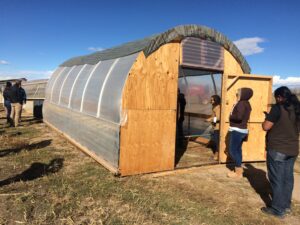
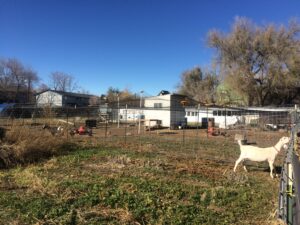
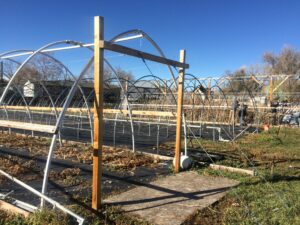
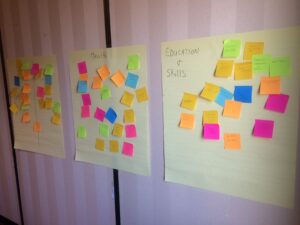
To allow leaders from a group of refugee farmers in Louisville to attend a professional conference, network with other agriculture leaders, and learn about farming and marketing practices.
11 leaders from the New American Farm refugee incubator program attended the 2018 OAK conference in Lexington. 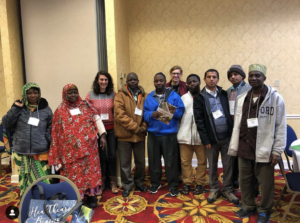
New American Farm business attended the Organic Association of Kentucky Conference in Lexington where we learned about organic soil & pest management, starting a CSA and met with other local farmers.
To expand knowledge of ecological and organic production practices and to help build bridges between programs in Ohio and Kentucky.
Christy Cassady attended this conference to gain additional knowledge of ecological and organic farming practices to share with her clients in Kentucky.
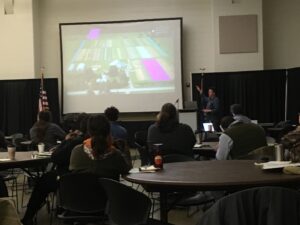
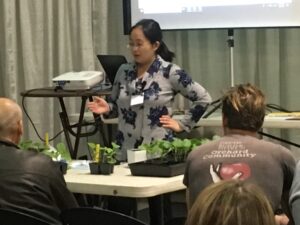
From Christy:
"By attending the February 2019 Ohio Ecological Food and Farm Association (OEFFA) Conference in Dayton, OH, I was able to build on previously established relationships with OEFFA personnel, as well as network with Michigan State University, University of Tennessee and Ohio State University faculty and/or staff. I was also able to network with growers from both Ohio and Kentucky, including one from whom I requested input on a Center for Crop Diversification (CCD) regional survey of organic growers and stakeholders. A conversation with an Ohio State University specialist made me aware of the Small Farm Conference & Trade Show coming up at The Ohio State University South Centers in late March. Attending that conference enabled me to line up two OSU specialists who have since reviewed two CCD publications, a crop profile on Christmas trees and a marketing profile on Pick-Your-Own operations."
To provide supplementary materials (mostly SARE) to support grower adoption of cover crops and sustainable business development.
Blending MSP and regional SARE funds, we were able to provide several additional publications to agents and producers across the state. In the picture below:
SSARE's Building a Sustainable Business
SSARE's Farmer's Guide to Business Structures
SSARE's Managing Alternative Pollinators
Midwest Cover Crop Council's Cover Crops Field Guide.
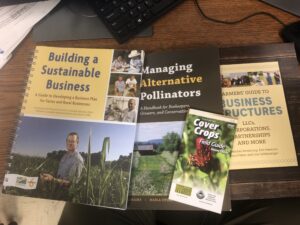
Hundreds of copies of these materials have been distributed to agents and producer leaders throughout the state, expanding the local library of sustainable agriculture materials.
To enhance awareness of the SSARE On-Farm and Producer Grants in the producer community.
Program Assistant, Brett Wolff presented information on SSARE grant programs at producer grant workshops hosted by the Kentucky Center for Agricultural and Rural Development (KCARD). Workshops occurred:
11/7/18 - Frankfort, KY
12/5/18 - Russellville, KY
12/11/18 - Covington, KY
12/12/18 - Morehead, KY
12/18/18 - Barbourville, KY
Workshops averaged around 20 attendees with several drawing over 50. Brett shared both SARE grant programs and the resources and publication.
To explore the potential contributions and challenges of genetic engineering of crops with respect to sustainability.
Genetically engineered crops (GE crops, also often called “GMOs”) generate substantial interest and controversy. SARE presentations on this topic are based strictly on scientifically credible evaluations of a wide range of sustainability issues. On the “plus” side, the public is commonly very interested to hear of the well-documented benefits of certain GE crops. For example, substantial reductions in insecticide use have occurred as a result of Bt traits in several crops throughout the world. Another example: GE papaya has literally saved the papaya industry in Hawaii. However, the public is equally interested in learning about the “minus” side: the legitimate concerns that scientists have documented with respect to certain GE traits. An excellent example of this is presented by herbicide-tolerant crops. Numerous studies have concluded there are significant benefits for farmers and the environment while some environmental and/or farmer advocacy groups dispute such claims. We finds that most members of the general public are interested in a fair-minded and scientifically accurate discussion of the risks and benefits of GE technology.
Because our SARE programs on GE crops are so well-grounded in objective and science-based analysis, the public seems to be consistently very appreciative of them (which has been documented quantitatively in post-program surveys).
Programs partially funded through SARE funds
Typical attendance varies from 10 to 40 people, commonly 35-65% female attendees
Titles of talks and discussions:
- Risks and Benefits of Genetically Engineered Crops, Madison County Extension Office, 28 Mar 2019
- GMOs, What You Need to Know, Woodford County Master Gardeners, 2 Mar 2019
- Risks and Benefits of Genetically Engineered Crops (GMOs), Estill County Extension Office, 28 Feb 2019
- GMO Crops: Scourge or Salvation? Kentuckiana Crops Meeting, French Lick, IN, 29 Nov 2018
- GMO Crops and Sustainability, Marshall County Extension Office, 23 Oct 2018
- GMO Crops, Boone County, 5 Dec 2018
- GMO Crops: Scourge or Salvation? Graves County, 9 Oct 2018
- Credible Science in a Digital World, Campbell County Master Gardener Graduation, 12 Jun 2018